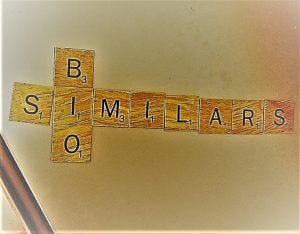April 27, 2021

The complexity of the biosimilar market was much in evidence last week with Roche and Biogen both citing competition as challenges in Q1.
Roche saw group revenues of CHF 14.9 billion ($16.3 billion) in the first three months of 2021, up 3% year-on-year. The contribution from diagnostics grew 55% to CHF 4.5 billion due to a surge in demand for COVID-19 testing.
In contrast, revenue from medicines fell 9% to CHF 10.6 billion. Roche said the decline was mainly because of the continued biosimilar competition and the COVID-19 pandemic.

The firm said competition faced by established cancer medicines MabThera/Rituxan (rituximab), Avastin (bevacizumab), and Herceptin (trastuzumab) remained significant, especially in the US.
Roche also cited biosimilar competition in Europe, Japan, and elsewhere as having a negative impact in the quarter.
In China the picture is somewhat different. Roche CEO Severin Schwan told analysts that although there are biosimilar versions of Avastin, MabThera and Herceptin in the country, to date the impact on revenue has been limited.
“There are biosimilars in China, but we are competing with them and we’re competing reasonably effectively… I think they will eventually penetrate the market more and cause more damage to our business. But for the moment, we’re still growing.”
Despite the negative impact of biosimilar competition Roche predicted pharmaceutical sales would grow in the low- to mid-single digit range in 2021, driven by an increased contribution from new products.
Pricing pressure
Biosimilars were also a topic of discussion for Biogen, which said revenue from such products was $205 million, down 6% on a reported basis and 13% on a constant-currency basis.
CFO Mike McDonnell told analysts: “Our biosimilars business continues to be negatively impacted by pricing pressure, as well as a slowdown in new treatments and reduced clinic capacity due to COVID-19.”
He added that “despite the continued impact of COVID-19, we continue to be the leading anti-TNF biosimilar provider in Europe and Benepali [etanercept, a biosimilar to Amgen’s Enbrel] continues to be the number one prescribed etanercept product across Europe.
“We believe we have the opportunity to continue to grow in Europe, as well as within the US and other geographies by commercializing new products.”
Biogen also suffered as a result of biosimilar competition according to McDonell, who cited MabThera/Rituxan – the drug it sells with Roche – as an example.
“Total anti-CD20 revenue in the first quarter of $389 million decreased 25% versus the prior year. Rituxan revenue decreased approximately 50% versus the prior year, partially offset by a 29% increase in OCREVUS royalties. We expect continued erosion of Rituxan due to biosimilars.”
Biosimilars plan
Biogen also shared details of a new partnership with Bio-Thera solutions designed to boost its biosimilars business.
CEO Michael Vounatsos said: “We aim to continue to grow our biosimilars business and create additional financial headroom for innovation by launching new products.
“To that end, we recently announced the collaboration with Bio-Thera Solutions to develop and commercialize BAT1806, a proposed biosimilars referencing [Roche’s] Actemra [tocilizumab], currently in Phase III development.”
He added, “Biogen will have the right to commercialize BAT1806 globally in countries outside of China, which will expand our global biosimilars footprint.”
About the Author
You May Also Like




